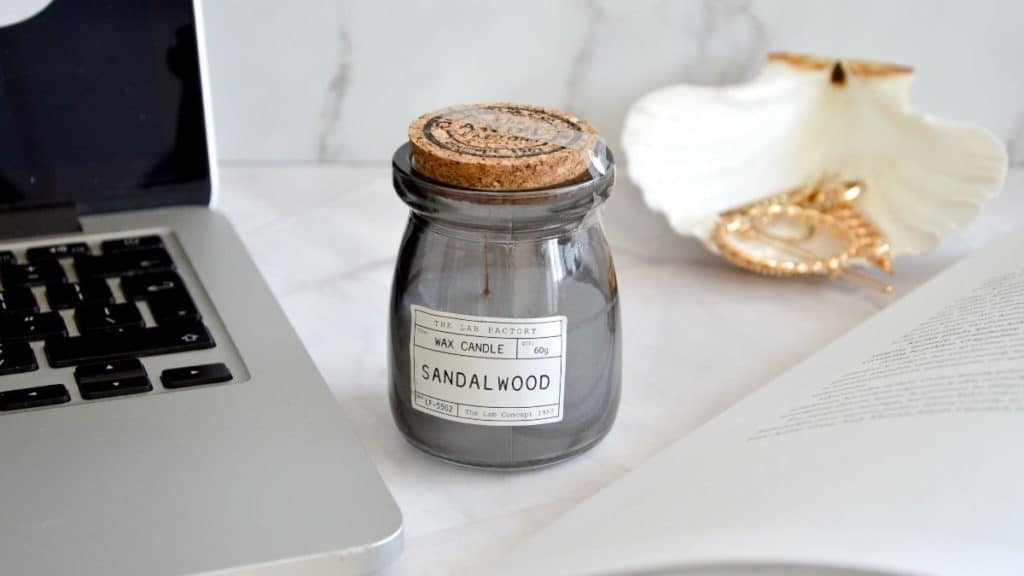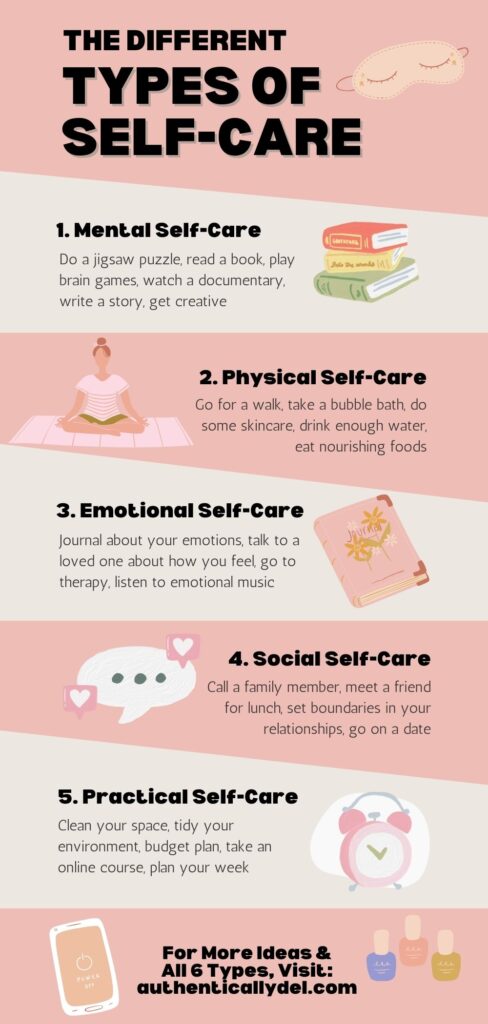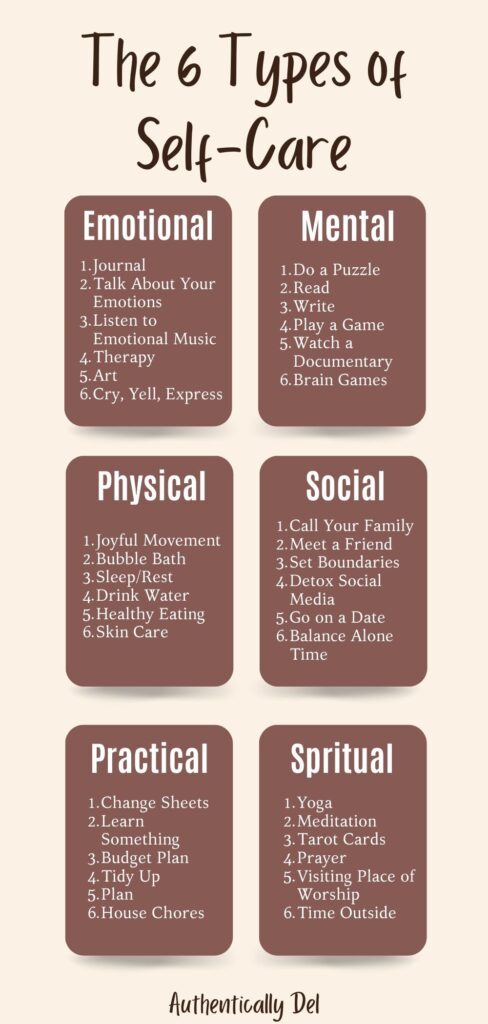This post may contain affiliate links meaning that, I may make commission if you purchase through my links. Learn More.
We all talk about self-care. But do you actually know the 6 different types of self-care and how to practice them?

Self-care is a hot topic.
When we say the words “self-care”, our mind often shifts to face masks and bubble baths.
While that is one example of self-care, the true meaning goes much deeper than that.
There are actually 6 main types of self-care.
Much like the 7 areas of life, the 6 types of self-care are helpful to understand when prioritizing caring for yourself.
When you understand each different type of self-care, you can start to balance your self-care routine to make sure you’re hitting each area.
The different areas of self-care are all of immense importance, yet our common face-mask-and-bubble-bath idea of self-care neglects most of these areas.
Self-care is deep and complex.
Gaining an understanding of the 6 different types of self-care and activities within each self-care category is an important first step.
Let’s jump into understanding the different areas of self-care and how you can start practicing each one.
6 Different Types of Self-Care
1. Emotional Self-Care
Emotional self-care is just as it sounds… it can be achieved through activities that actively engage and connect with our emotions. Anything that requires you to recognize, feel, reflect on, or express an internal emotion is most likely a form of emotional self-care.
2. Physical Self-Care
Physical self-care is what we often think of when we hear the term “self-care”.
This is the bubble bath and face mask we talked about earlier.
But, simple everyday things also tend to your physical well-being. As a whole, your physical self-care is all about taking care of your physical health and well-being.
3. Mental Self-Care
Mental self-care is often confused with emotional self-care.
They do seem to overlap a little bit – but they are different.
Mental self-care refers to anything that actively engages your mind and stretches your brain. One great example of this is reading. We will dive into more examples later.
4. Social Self-Care
Social self-care is achieved by tending to your relationships.
Familial, romantic, platonic, etc. – all of our relationships affect our overall health and well-being.
Taking time to consciously and actively care for our relationships in any way is a form of social self-care.
5. Practical Self-Care
Practical self-care, which I often call productive self-care, is doing the mundane everyday tasks that your life requires.
By doing these tasks, you are helping free yourself from stress, overwhelm, or a stagnant life. I bet you never thought paying bills was self-care, but it is! That is an example of practical self-care.
6. Spiritual Self-Care
Spiritual self-care is another area of self-care that often gets mixed in with others.
Even though mental and emotional self-care seem similar, spiritual self-care is its very own type of self-care.
Spiritual self-care includes activities that encourage or require you to think bigger than yourself as you connect to the universe or, for some, a religious figure.
6 Ideas for Each Type of Self-Care
To give you a better understanding of how you can incorporate all areas of self-care into your life, here are 6 examples for each of the 6 types of self-care.
Emotional Self-Care Ideas
A form of self-care that requires feeling, addressing, expressing, or responding to your emotions.
- Journaling about your emotions
- Talking to a loved one about your emotions
- Listening to emotional music
- Going to therapy (online therapy is a great, less intimidating option!)
- Creating art to express yourself
- Crying, yelling, laughing, or otherwise externally expressing emotion
RELATED POST: 50 Journaling Prompts for Mental Health
Physical Self-Care Ideas
A form of self-care that expresses care and attention for your physical well-being.
- Joyful movement (walks, stretching, dancing, etc.)
- Taking a bubble bath or a self-care shower
- Getting enough rest each night
- Drinking enough water throughout the day
- Nourishing your body with nutritious foods (and enough food)
- Skin care, face masks, hair care, self-tan, etc.
Mental Self-Care Ideas
A form of self-care that engages your mind and stretches your brain.
- Doing a jigsaw puzzle
- Reading a book
- Writing a story
- Playing a game
- Watching a documentary
- Playing brain games/puzzles
Social Self-Care Ideas
A form of self-care that nurtures the relationships in your life.
- Calling a family member
- Meeting a friend for lunch
- Setting boundaries in your relationships
- Cleaning out your social media (follow only positive accounts)
- Go on a date
- Understand your personal balance of social and alone time
Practical Self-Care Ideas
A form of self-care that involves maintaining a productive, successful, and well-managed life.
- Changing your sheets
- Taking an online course
- Budget planning
- Tidying your workspace/living environment
- Planning your days/weeks
- Staying on top of house chores
Spiritual Self-Care
A form of self-care that encourages you to think larger than yourself – your environment, the universe, higher powers, etc.
- Practicing yoga
- Meditation
READ: 10 Meditation Essentials for Beginners
- Reading your tarot cards (or having them read)
- Prayer
- Going to a place of worship
- Spending time outside to connect to your environment
Customize Your Types of Self-Care
Self-care is not a one-size-fits-all type of thing. In fact, it’s meant to be unique to each individual. That’s what makes it effective.
Customize your areas of self-care for your own life.
Know that you have complete and total freedom to shift your self-care practice to whatever fits your needs at any given moment.
Want to separate the practical self-care area into two categories – work and home?
Do it!
Don’t feel like spiritual self-care applies to you?
Replace it!
These 6 types of self-care and ideas for each area of self-care are intended to give you a baseline for building a self-care practice that works for you.
Ultimately, this will look a bit different for each individual.
Build your own balanced self-care routine to appeal to your wants, needs, and desires. That is the key to achieving true, effective self-care.
More Self-Care Posts for You
How to Build a Self-Care Shower Routine


Stacey K. says
I have started journaling my feelings and I feel that it has helped a lot. Great tips Del.